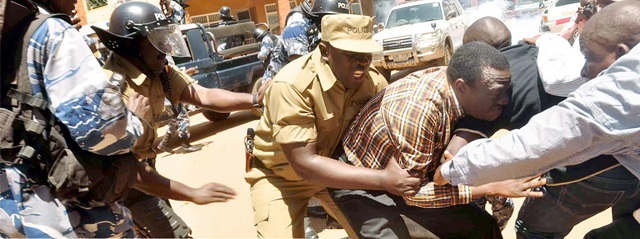
Lessons from Besigye
The defiance approach has been a subject of controversy since Besigye introduced it in the build up to the 2016 elections.
Besigye had vowed not to participate in 2016 elections if the electoral process was not reformed.
But in a surprise move, he got nominated, defeated then FDC President Mugisha Muntu to win the party ticket and launched into campaign mode amidst intense criticism.
“We are participating to win this election and we shall win this election. We shall win the flawed elections. We shall not win it by compliance but by defiance,” Besigye said while addressing journalists at his Katonga Road office on October 8, 2015.
In reaction, then-Electoral Commission chairman Badru Kiggundu said Besigye’s campaign was aimed at inciting violence during the elections. Kiggundu even threatened that he would deploy the military to counter Besigye’s campaign.
As part of the defiance campaign, Besigye would routinely emerge from his home and start walking, a crowd would grow around and walk with him, the police would pounce; often with teargas and live bullets. The crowd would flee and Besigye would get arrested and be taken to a police cell until late in the night when he would be released back home.
At one point, Police mounted a 45-day siege at his home until pressure from diplomats and activists forced them to leave. Even after, he remained under tight surveillance but did not stop his defiance activities.
At one point, the Deputy Attorney General, Mwesigwa Rukutana, sought a Constitutional Court declaration that Besigye and FDC’s defiance campaign was illegal.
On April 29 2016, Deputy Chief Justice Steven Kavuma, who at the time headed the Constitutional Court, issued the order and banned the FDC activities.
But Besigye described Kavuma’s the order as illegal and said he would defy it. Besigye defied the Electoral Commission by challenging the results of the 2016 election. He said he had “incontrovertible evidence” that he won the election with 52% of the vote although the EC declared Museveni winner.
Basing on this, Besigye demanded an internationally supervised independent audit of the 2016 election results. When the EC did not act, Besigye decided to get sworn-in as president. A day to the May 12 official swearing-in of President Museveni, Besigye who had been under house arrest escaped and emerged in the city centre. Shortly after, a video of his purported swearing-in emerged.
Besigye was then arrested and charged with treason. Prosecution alleged that Besigye and others, between February 20 and May 11, planned to forcefully ascend to the Office of the President when he declared himself the elected president of Uganda.
He was remanded to Luzira until June 1. But Besigye has not abandoned the campaign. Following his release in July, he went to work and later announced the people’s government with fully-fledged structures.
However, ever since Bobi Wine announced intent to run for president in 2021 and his `People Power’ gathered strength, the authorities appear to be targeting him more than even Besigye.
They have blocked his rallies, appearances on radio, and laid siege at his home. For some, this is a sign that Museveni sees Bobi Wine as a bigger threat. The question now is whether Bobi Wine’s going the defiance way will advance or frustrate his ambitions for 2021.
 The Independent Uganda: You get the Truth we Pay the Price
The Independent Uganda: You get the Truth we Pay the Price




no jobs for the newly graduated students why?